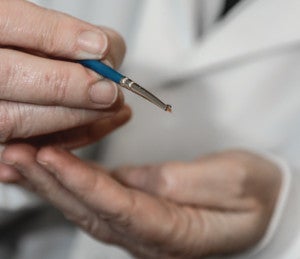discover
GOING SMALL TO BETTER UNDERSTAND HUMAN HEALTH
 photo: Roadell Hickman
photo: Roadell HickmanThough small, fruit flies share many genes with humans and have been used in medical research for more than a century.
Case Western Reserve researchers have pinpointed a gene and brain circuitry responsible for the fruit-fly version of speed dating.
In a study featured in PLOS Biology, a team led by Rui Sutton De Sousa Neves, PhD, a genetics and genomic sciences research scientist at the School of Medicine, detailed the discovery that allows a female fruit fly to choose Mr. Right in just 15 minutes.
"Flies have the same neurotransmitters we do," Sousa Neves said. "The ability to make decisions is not just a privilege of humans."
Such connections between fruit flies and humans offer a reminder of an intriguing reality: We're not that different genetically.
Flies have about 13,000 known genes, humans only a few thousand more. They also have brains, eyes and nervous systems that use the same genes that exist in humans.
That's why the tiny red-eyed insects are the workhorses of genetic research, used to study human biology, health and conditions including cancer, diabetes and heart disease. And it's why hundreds of thousands of them are in research labs on campus.
"If we think of genes as car parts, then a fruit fly might be akin to a Yugo and a human to a Porsche," said Helen Salz, PhD, a genetics and genome sciences professor in the medical school. "Although Porsches are more sophisticated machines, both cars have wheels, roofs and tailpipes, and what we learn by studying a Yugo will likely apply to a Porsche."
Flies also develop much faster than humans, and investigations that would take generations in humans can happen in weeks or months in flies. By breeding fruit flies with small genetic mutations and studing resulting changes, researchers have learned more about the workings of human genes and chromosomes, and gained other insights into human health, biology, genetics and the mechanisms of diseases.
For example, Salz and her colleagues discovered that adult stem cells in fruit flies must remember whether they are male or female. Cells that do not remember their sex can inadvertently turn on genes that should be kept silent, which in turn can lead to cancer.
Meanwhile, Sousa Neves and Claudia Mizutani, PhD, an associate professor of biology in the College of Arts and Sciences, have developed advanced tools to visualize individual cells within complex tissues with much higher resolution than before, allowing for more precise studies of embryonic development and aging brains.
Yet the functions and connections of thousands of fruit-fly and human genes have yet to be fully understood, said Heather Broihier, PhD, an associate professor of neurosciences in the medical school. Her research into the development of neural circuits in fruit flies could provide new insight into neurodevelopmental disorders such as autism and schizophrenia.
"We have to be humble," she said. "After decades of research, we have so much more to learn."






